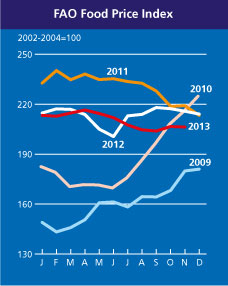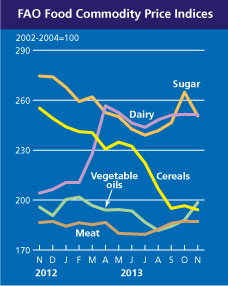2014 is shaping up to be an exciting year in the food policy world – wherever you look, new policies are about to be decided upon and/or implemented. So let’s have a look across the globe and see what’s on the agenda, shall we?
USA:
After Congress spectacularly failed to finalize the Farm Bill during its last session 2013 – which resulted in considerable uncertainty for farmers all around -, the Bill is on the top of the legislative agenda for the new year and is likely to be finished in January (this link has a nice summary of the proposed changes as well). Better late than never, I guess, although there is plenty of scorn for the fact that the Bill is now 2 years late (the US is still on the 2008 bill which should have only lasted for 4 years and been replaced in 2012).
Another roundup of what US farmers are probably facing in 2014 mentions the proposed cut in the US ethanol mandate, which could affect corn prices quite significantly, even possibly letting them fall under break-even values. Thus, there is a huge lobbying effort in course to try and continue the mandate, despite its converse environmental effects which I wrote about here.
Here is a final outlook for US producers which also look at crop production (challenging due to higher break-even prices), livestock (strong profitability ahead) and land values (which are at record levels at the moment). Interesting year ahead, I daresay!
EU:
The European Union is transitioning to a new-and-reformed Common Agricultural Policy in 2014, which will be in place until 2020. The transition year will likely bring interesting changes that will have direct impacts on farmers; though the direct payments and rural development policy changes only come into effect as of 1 January 2015, as the Council and Parliament agreed in June to postpone them. What will come into effect as of this week is, for example, that funds will be able to be transferred more easily between the pillars by member states; that smaller farmers will be able to get more support through redistributive payments; and that some coupled support schemes can be extended by Member States. Confused yet? Don’t worry; I’m planning on an FAQ post on the CAP and its reform in the next couple of weeks to bring some light into the dark (for myself as well!) But things are a-happening in the EU as well next year for sure 😀
International:
As I already mentioned, the FAO is celebrating a year of Family Farming over the next 365 days. What else is happening in Rome? At its last Strategic Conference in June 2013, the organization’s leadership agreed on its new objectives, which are as follows: to increase agricultural production while ensuring sustainable ecosystem and climate change; management; eradicate food insecurity, nutrient deficiencies and unsafe food; improve the quality and balance of food consumption and nutrition; improve the livelihoods of populations in rural areas; ensure more inclusive food and agriculture systems; increase resilience of livelihoods to threats and shocks; and strengthen governance mechanisms.
2014 is also the last year before the Millennium Development Goal deadline of halving hunger across the world; and apparently, 38 countries came in in advance of the deadline. Congrats! In addition, they just released the 2013 food price index – food prices were lower than in the record years of 2008 – 2011, but still not all the way down to before the record spike.
WTO:
The latest development in the never-ending post-Doha negotiations just took place in Bali (wouldn’t you like to be a WTO negotiator?) in December and resulted in some advancements in the food policy realm of developing countries – according to the Bali package, “India and other developing counties are given a four-year exemption from WTO agricultural subsidy rules so that these countries can continue to subsidize poor farmers and stockpile grain in “food security” programs. This exemption was especially important to India’s government, which faces elections in 2014 and has made food security for the poor a major campaign promise.” I wrote about India’s plan to implement the right to food earlier this year; 2014 will show whether this is actually a do-able promise. Other commentators posit that, if the WTO really wants to advance their agenda, they will have to move forward on the real intractable issues related to agricultural trade, including breaking down the access barriers of developed countries regarding their agricultural markets. Maybe within the next year?
One possible first step to keep track of are the EU-USA Transatlantic Free Trade Agreement (TAFTA) negotiations which started in July 2013 and will continue throughout next year. However, opinions are mixed whether this is really a good thing – Friends of the Earth contend that “the drive for ‘regulatory coherence’ risks pushing food and farming standards down in the US and EU. Big food and biotech companies are pushing to eliminate EU restrictions on genetically modified (GM) foods and food additives, challenge food labelling laws which they think are barriers to trade, and undermine the EU’s use of the ‘precautionary principle’ in setting food safety standards. The trade talks could also threaten local food schemes in the US and EU that seek to direct public spending towards healthier, sustainably produced school meals.” According to Friends of the Earth Europe, it might be counterproductive to agree on any trade deal that could entail attempts “to deregulate polluting industries, harmonise safety or product standards downwards, or limit future legislation at the national, state or local level to rebuild food and farming systems.” This is a great topic to look into further as well, keep your eyes peeled!
I know that I didn’t nearly cover all regions and/or countries, and wasn’t very extensive in the analysis of the issues I did mention, but that just means you’ll have to keep reading next year as well 😉
What is on the agenda in your country, region, or organization next year? I’m really curious to get more inspiration on what to look out for in the next couple of months so don’t be shy!



0 thoughts on “2014 – What's on the Food Policy Agenda?”